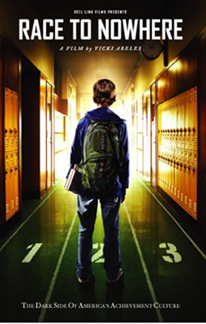
Last Saturday in Los Angeles, I went to see Vicki Abeles's film, Race to Nowhere. If you haven't heard about this film already, check out the website right now. If you care about the future of our country, you are going to want to see this provocative film.
Race to Nowhere is about what it's like for us right now living under the influence of the No Child Left Behind law, and if we stay on the path we are on, where we will most likely end up. In other words, it's a documentary about the pressure epidemic running rampant in our school system. And who is affected? Kids, teachers, parents, families, school administrators, local communities, state and national governments. In other words, just about everybody.
Picture this: A middle school student, let's call her Samantha, goes to school for seven hours, plays her sport after school for three hours, arrives home by about 7pm and eats a quick dinner as her parents drill her about her grades and her homework, then goes to her room to complete six hours of homework she has been given (1 hour for each subject because her teachers don't want to look 'lazy'), struggles to stay awake so she takes an Adderall that one of her friends who has been diagnosed with ADD gave to her so she can stay on top of her game and compete with the other students in her class. (Deep breath.) Okay, moving on.
In this process, Samantha discovers that skipping meals helps her stay awake at night and creates a kind of self-induced insomnia. Never mind the headaches she is getting every day due to the stress from the pressure to perform. Her parents are already talking about building her application for college admissions. Heck, the average weighted GPA to get into University of California Berkeley is 4.35. In other words, to get into the state university, students have to be more than perfect.
"We live in a society today where you have to be smart, but also have to be pretty, and also you have to do sports and you have to be involved in art, and you have to find something unique about yourself. And you have to know yourself, because if you don't know yourself, before you do all that, you're going to lose yourself," says Kelly, a high school student interviewed in Race to Nowhere.
 It's interesting to note that businesses today are observing that recent college graduates are not coming to work armed with the skills of critical thinking and problem solving. Instead, business are noticing these graduates are more comfortable with and suited to memorize and take direction. Since the 'No Child Left Behind' policy (Bush signed into law in 2002) has brought about a culture of teaching to the test, the students rising through our education system are learning how to be great memorizers, but not critical thinkers. "I learn what I need to for the test, and then it's gone," reported one high school student.
It's interesting to note that businesses today are observing that recent college graduates are not coming to work armed with the skills of critical thinking and problem solving. Instead, business are noticing these graduates are more comfortable with and suited to memorize and take direction. Since the 'No Child Left Behind' policy (Bush signed into law in 2002) has brought about a culture of teaching to the test, the students rising through our education system are learning how to be great memorizers, but not critical thinkers. "I learn what I need to for the test, and then it's gone," reported one high school student.
How does this bode for the lives of young people and the future of our country?
 Not well, of course. First off, health issues are a big concern. The number of young people suffering from headaches, chronic fatigue, anxiety, anorexia, obesity, depression and suicide is on the rise. In fact, not long after failing a math test, a 13-year-old young woman in Vicki's community committed suicide. She was a straight A student, extremely talented in music, loved nature and had a cheery disposition. It stunned everyone in Vicki's community. Race to Nowhere is dedicated to her memory.
Not well, of course. First off, health issues are a big concern. The number of young people suffering from headaches, chronic fatigue, anxiety, anorexia, obesity, depression and suicide is on the rise. In fact, not long after failing a math test, a 13-year-old young woman in Vicki's community committed suicide. She was a straight A student, extremely talented in music, loved nature and had a cheery disposition. It stunned everyone in Vicki's community. Race to Nowhere is dedicated to her memory.
"Everyone expects us to be superheros." -- a student in the film
Many educators agree that our students today are pressured to perform, but they are not necessarily pressured to learn, especially to learn deeply and conceptually. "We are always looking at the next step," said one educator. "They say that in elementary school, we have them worrying about high school."
The pressure to perform not only takes a toll on children's physical health, but also their mental and emotional health. Studies have shown that over 80 percent of high school students are cheating because they feel it's the only way to accomplish everything that has been put on their plate.
Teachers are under pressure too. If students don't perform well (measured by test scores), it reflects badly on the teacher. The teacher is then at risk of losing money for her school, her paycheck, and ultimately losing her job. For this reason, teachers have admitted to turning the other way when their students cheat. The formula: High scores = I can keep my job.
"We want to make sure that our kids aren't always performing for adults ... always filling in boxes for us ... always looking good for us," said Kenneth Ginsburg, MD, associate professor at The Children's Hospital of Philadelphia and specialist in adolescent behavior, in an interview on Oprah radio. "We have to make sure they have some unscheduled downtime to really play ... Play has huge development benefits for kids."
According to Ginsburg and other medical and education experts, play helps children develop both socially and cognitively. In other words, free time on their own (as opposed to organized sports) allows children the opportunity to problem-solve, which in turn enhances their creativity. In an interview in the film, Vicki's middle school daughter commented: "I can't really remember the last time I had a chance to just go out in the back yard and just run around."
The question remains how do we want to define success in our schools? A high GPA? Being class president? Captain of the soccer team? Maybe. But what about happiness? Is there a metric for happiness in our education system?
Right now, we are caught on a treadmill of teaching to the test and pressuring kids to perform instead of learn. I think that pushing our kids to perform could actually be getting in the way of their success. If you ask me, instilling a lifelong love of learning is a really good path of happiness.
Look for my upcoming blog about things you can do to make a difference.
